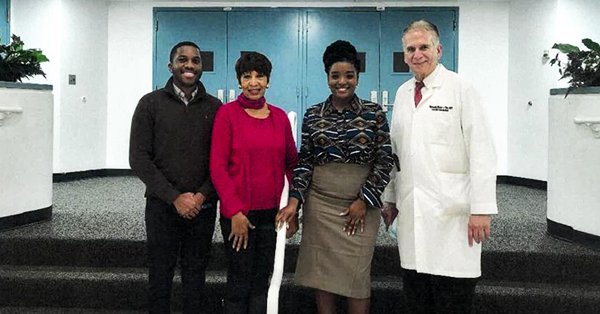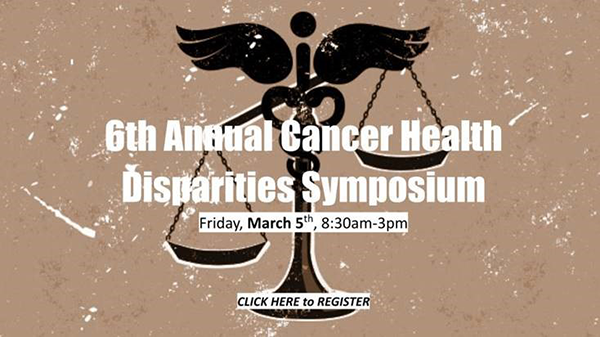|
College of Medicine
Takisha Morancy and Christopher George Awarded 2021 Full Year Research Scholarship!
 From Left to Right: Christopher D. George, MS3; Monica Sweeny, MD, MPH, Chair of the Board of Trustees of the Alumni Association; Takisha Morancy, MS3; and Richard Sadovsky, MD, MS ,Chair of the Alumni Association Research Scholarship Committee
From Left to Right: Christopher D. George, MS3; Monica Sweeny, MD, MPH, Chair of the Board of Trustees of the Alumni Association; Takisha Morancy, MS3; and Richard Sadovsky, MD, MS ,Chair of the Alumni Association Research Scholarship Committee
Research is one of the essential underpinnings of medicine, and here at Downstate,
it continues to be at the heart of our academic programming, and central to our institutional
mission and core offerings. Annually, for nearly 20-years, the College of Medicine (COM) Alumni Association has awarded the “Full Year Research Scholarship” in support
of student-led medical research— providing up to $36,000 for students to conduct and
complete their investigations throughout the course of one full academic year. The
scholarship funds are awarded to students with a distinguished academic record and
whose work has demonstrated a vested interest in a particular area of medical research.
To be eligible, students need one full academic year under their belts, and must articulate
their research experience and interests, professional goals, as well as a comprhensive
overview of their research proposals. Considering the high volume of applications
from highly-competetive applicants, the selection process is managed carefully by
the Alumni Association, with each application reviewed and ranked by three specialized
researchers from various specialties. Following the review and ranking, Richard Sadovsky, M.D., Professor and Chair of the Department of Family Medicine, presents the results before
the the Board of Trustees of the Alumni Association, chaired by Monica Sweeny, M.D., MPH, FACS, Professor Emeritus in the School of Public Health's Department of Health Policy and
Management. Together, the Board of Trustees determine the number of recommended recipients, and then vote on the winners.
I am excited to share that this year, two third-year underrepresented minority medical
students, Takisha Morancy and Christopher D. George, were selected as the recipients of the COM Alumni Association’s 2021 Full Year Research
Scholarship!
Ms. Morancy’s project, “Symmetric Facial Nerve Reanimation,” stood out to the Board of Trustees for its ability to greatly advance existing scientific
literature and was awarded first place and the top prize of $30,000 by members of
the Alumni Association Board of Trustees. Mr. George took home the second prize of
$10,000 for his research project, “Revitalizing Early-Stage Melanoma Treatment: Using Patient and Tumor Characteristics
to Predict Distant Metastasis”. Both students will focus on their approved research proposals throughout the 2021-2022
Academic Year.
CONGRATULATIONS on this well-deserved honor, Ms. Morancy and Mr. George. I look forward
to following the progress of your work over the coming year.
Awardees from the last couple of year’s scholarship cycle and their topics include:
- Ryan Bender, 2020: Towards Personalized Breast Cancer Care: A Vascularized, Three-Dimensional Biomimetic
Platform for Patient Specific, Ex Vivo Studies of Breast Cancer
- Natasha Masub, 2019: Blue Light Photodynamic Therapy as a Modulator of Gene Expression in Squamous Cell
Carcinoma
- Eric Schoenfeld, 2019: Early Life Stress and Serotonin Transporter Gene Polymorphism Interaction: Impact
on Hippocampal Volume Asymmetry
- Jin Jyun Oh, 2019: Outcome Measurements of RHO Retinopathy to Monitor the Efficacy of ‘ablate and
replace’ gene therapy
- Nadlie Toussaint, 2019: Overcoming Chemo Resistance in Pancreatic Cancers by Blockade of EXTL
Downstate Holds Sixth Annual Cancer Health Disparities Symposium

Last month, Downstate hosted the Sixth Annual Cancer Health Disparities Symposium to address the pooor cancer health care outcomes in communities of color. The symposium—
sponsored by Downstate's Department of Medicine’s Division of Gastroenterology and
the Brooklyn Health Disparities Center along with Cold Spring Harbor Laboratory and
Stony Brook University sponsored— was designed to tackle the roles healthcare providers,
scientists, and community groups can play in mitigating the cancer health disparities
in communities of color.
The Symposium was divided into three sessions:
- Session 1 included talks on colon cancer and screening including a colon cancer survivor and
advocate
- Session 2 covered presentations on pancreatic cancer and the New York Genome Center’s Polyethnic-1000
Initiative
- and Session 3 addressed machine learning/artificial intelligence’s potential role in cancer screening
and research.
The above sessions were led by a series of experts from the University of Puerto Rico,
Henry Ford Pancreatic Cancer Center, University of Massachusetts Medical School, Moffitt
Cancer Center, Weill Cornell Medicine, University of Kansas Medical Center, and the
American Cancer Society.
The symposium kicked off with F. Charles Brunicardi, M.D., FACS, Dean of the College of Medicine, Moro Salifu, M.D., MPH, MBA, FACP, Professor & Chair for the Department of Medicine, Chief of the Division of Nephrology,
and Director of the Kidney Transplant Program, and David Tuveson, M.D., Ph.D., Director of the Cold Spring Harbor Laboratory Cancer Center, giving opening remarks.
The event later culminated with Otis Brawley, M.D., former Chief Medical and Scientific Officer of the American Cancer Society and
currently the Bloomberg Distinguished Professor of Oncology and Epidemiology at Johns
Hopkins University, providing the keynote address entitled, “Cancer Control in the 21st Century and Disparities in Health”.
During Closing Remarks, Alfred Lacks Carter, Jr., the grandson of Henrietta Lacks, gave updates on the passage of the Henrietta Lacks
Enhancing Cancer Research Act of 2019 and upcoming events for HELA100, Henrietta Lacks
Centennial Celebration.
At the conclusion of the symposium, participants walked away with the ability to:
- “Interpret the current research infrastructure for engaging cancer health disparities
research
- Distinguish the recent advances made in cancer health disparities research
- Realize the experience of cancer screening in minority populations
- and List tactics to improve participation of minority populations in cancer research
studies.”
Many thanks to Drs. Brunicardi, Salifu, and to all participating faculty and staff
in the Department of Medicine for making this virtual symposium a success.
If you missed the event, CLICK HERE to watch on-demand recordings of every session. (To view, click on View Sessions on the right side menu, then on the meeting title
and Click on Presentation.)
*PASSCODE for viewing: J61?cwK?
|